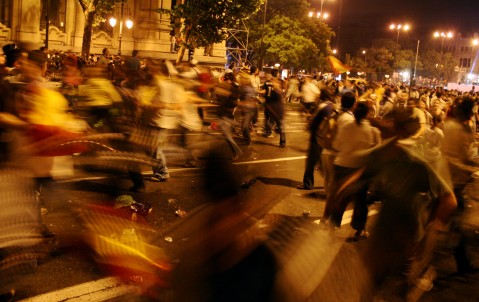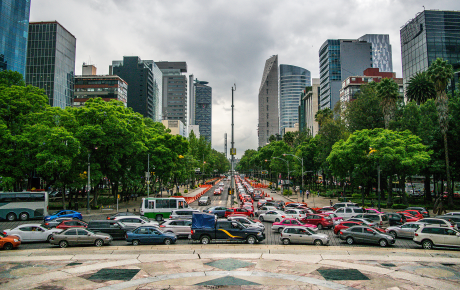
Political violence hard market conditions are here to stay
The prospect of widespread global civil unrest driven by COVID-19 following several lean years in the sector means the hard cycle we see today is unlikely to turn again soon.
The coronavirus pandemic caused a wary peace to break out after months of protests and strife in some countries. But, that calm is unlikely to hold for much longer – as we are starting to see in the US, UK and Hong Kong, among other places.
Simmering discontent, which was often only quelled when governments imposed strict quarantine measures to contain the virus, is expected to boil over again once lockdowns lift, as we are set to plunge into the deepest recession in living memory.
Around the world, people’s experience of the pandemic has differed according to their wealth, class and race. It has widened existing social fault lines exposed last year in a wave of spontaneous social unrest in Algeria, Bolivia, Chile, Ecuador, China, France, Spain, Venezuela, the UK, Lebanon, Iran, Iraq and the US.
For 2020 and beyond, the pandemic is a new driver for activism and civil unrest, with economic distress and healthcare inequality underpinning new political challenges
The underlying resentments that triggered those protests – poverty, inequality, discrimination, poor public services, political corruption and democratic alienation – will have been further fed by countries’ handling of the virus and its devastating economic fallout.
For 2020 and beyond, the pandemic is a new driver for activism and civil unrest, with economic distress and healthcare inequality underpinning new political challenges, according to Control Risks.
Some governments’ faltering response to the pandemic is likely to further undermine already-waning public trust in them. Before the COVID-19 crisis broke, many large democracies – including the US, UK, Brazil, Mexico, South Africa, Colombia and Australia – were experiencing their highest levels of civic discontent since the 1990s, while others, like Japan, Greece and Spain, were close to all-time highs, according to a report published this year by the University of Cambridge’s Centre for the Future of Democracy (CfFD).
Democracy in trouble
Across the globe, democracy is in a state of malaise, the report warns. Now, governments must navigate a global economic recession forecast to be the deepest since at least World War Two, with the highest number of countries likely to be in recession at the same time since 1870, according to the World Bank.
Debate over whether the recession will be ‘V’,’U’, ‘W’ or ‘L’ shaped will mean little to the many people who previously struggled to make ends meet and now face even greater hardship. Governments’ inability to ease their suffering, having borrowed heavily to prop up their economies during the pandemic, mean the ingredients are in place for the 2020s to be a decade of dissent.
Latin America is particularly vulnerable to renewed unrest. The continent has become the new centre of the COVID-19 outbreak, and there has been growing public criticism of the response in Mexico, Brazil, Colombia, Peru and Venezuela – countries that were already suffering “crisis” levels of democratic discontent, according to the CfFD.
Now, governments must navigate a global economic recession forecast to be the deepest since at least World War Two, with the highest number of countries likely to be in recession at the same time since 1870
In Chile, parts of the country – particularly the poorer areas of Santiago – are ready to ignite. One of the continent’s wealthiest countries, it is also one of the most unequal. Months of unrest were only quelled by President Sebastián Piñera imposing a strict lockdown. Now, its unemployment rate has reached its highest level in a decade and it has one of the worst per capita infection rates in the world, which could spark renewed dissent.
In Mexico, widespread discontent at its government’s inability to contain the virus and tackle deep-rooted grievances could boil over into further unrest. Strikes have already broken at factories across the northern Mexican industrial centres of Ciudad Juárez and Tijuana, when workers protested about the lack of measures to protect them from the virus.
In the US, the far higher COVID-19 death rate within BAME communities has fanned the flames of already-smouldering racial discontent. Hundreds of thousands of people participated in huge rallies in cities in support of the Black Lives Matters (BLM) protest movement, which soon spread to other countries, including the UK. More protests – as well as counter-protests – are likely, which will further raise the political temperature.
In Hong Kong, the Chinese government’s announcement in May that it would impose sweeping national security laws sparked a renewed wave of anti-Beijing rallies, raising the risk of further riots as the regime tries to quell dissent in the territory.
Rate hardening
It’s no surprise, given this backdrop, that the political violence market is now seeing the first proper signs of hardening since the September 11, 2001 terror attacks.
Several medium-sized players have withdrawn from the market in recent months, leaving gaps on some programmes. As a result, placements for some distressed business in high-risk countries such as Chile, have not been completed. At the same time, many property insurers that previously offered an element of political violence coverage in their policies are now limiting that or trying to exclude it completely. This has resulted in more business being pushed into the specialist market.
Some believe that, once the COVID-19 crisis passes, the market will quickly return to how it was before. But, we think the prospect of widespread global civil unrest, following several leaner years in this sector, means the cycle is unlikely to turn again soon. Losses are starting to feed into the market from the unrest in Chile and the BLM riots in the US, and more are likely.
This is not the first time that London’s political violence market has stepped up when others have stepped back, and it certainly won’t be the last.
With the threat increasing, rate reductions are much harder to find. Standard terror policies in benign countries are renewing at the same rate as last year, while terms and conditions are being tightened and rates nudged up on medium-risk business. High-risk business is being re-underwritten.
We have, along with our market peers, have adjusted our risk appetite, in consultation with Control Risks, to reflect the increased exposures we face in countries such as Turkey, Brazil, Mexico, Lebanon and Chile. In such an uncertain political and economic climate, we remain committed to helping our customers, which is why we’re working hard with brokers to ensure they still get the protection they require at a fair price.
This is not the first time that London’s political violence market has stepped up when others have stepped back, and it certainly won’t be the last.
*****************************
This article was first published by the Insurance Day on 1st July 2020: https://insuranceday.maritimeintelligence.informa.com/ID1131402/Viewpoint-Political-violence-hard-market-conditions-are-here-to-stay




